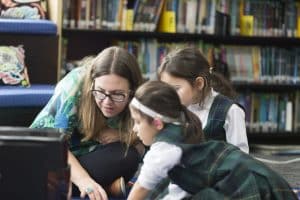Congratulations to Strathcona’s Head of Digital Learning and Innovation, Michelle Dennis who has been included in The Educator’s 2018 Hot List!
The Educator’s 2018 Hot List showcases the movers and shakers of Australian education, setting the standard for educators across the nation.
Michelle is a first generation digital native and is committed to educating young girls about the ever-evolving landscape that is STEM (Science, Technology, Engineering and Mathematics). We sat down with Michelle to discuss her Hot List nomination and her passion for teaching tech;

Can you tell us about your role at Strathcona Baptist Girls Grammar?
This year my role has been to look for opportunities and develop them in terms of technology so I’ve been in almost every classroom from Prep to 12. For example, one day I was working with Year 5s to develop 3D moulds from playdough and then talking to the Year 12s to assist them to study better and manage technology distractions. If, from the very beginning, girls don’t see technology as something that can include them, then they are far more likely to say ‘no’ when they’re offered with such subject choices in the later years.
What does this nomination for The Educator 2018 Hot List mean to you?
It is an honour to be listed with such a brilliant range of educators. I think it demonstrates that the team at Strathcona is on the right track with educational technology; recognition like this helps spur our efforts and inspire further change. I’m privileged to work with an amazing group of colleagues that is willing to take risks to achieve real educational innovation; in particular, the #coLAB team and Eleni Kyritsis who is the Head of Curriculum and Innovation in the Junior School.
What technological initiatives and projects are you currently working on?
When most schools start to wind down, at Strathcona our Year 7s will be finishing the year with a bang in #coLAB. In this intensive collaborative program, our students will have a week to design and build a computer game which aims to educate or solve a social problem. In addition to developing coding and problem-solving skills, they’ll look at how programs like Pokemon Go, WiiFit or Fitbits use gamified experiences to influence behaviour and mindsets.
How do you integrate STEM within practical education to resonate with students?
I think it is really important to give students access to industry-level tools; it gives them confidence and access to more pathways. This is why this year I’ve worked with Year 10 and 11s to use the game development environment ‘Unity’ to develop VR experiences. Unity is behind many of the well-known games out there, including Temple Run, Assassin’s Creed: Identity and Monument Valley. Students need to get their head around the complicated user interface, managing shared assets and programming in C#. At the end of their experience, it is my intention that they have the confidence to pick up any tool.
Do you have any advice for young women wanting to pursue a career in a male-dominated industry such as tech?
There are a lot of networks out there that can support women in technology. My first piece of advice would be to look outside of your institution. There are a number of other organisations out there to support young women in technology. For example, I’m a member of Girl Geek Academy which looks to educate women in technology. Young women need to start looking at using social media in a really intelligent way, as a way of building a professional network. For example, LinkedIn and Twitter are great for connecting people in technology and for finding mentors that can support them in their journey. There is a whole world to support you if you have the passion and drive.


